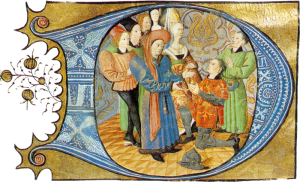Tags
Battle of Agincourt, Charles d'Orléans, Claude Debussy, Hella Haasse, Le Temps a laissé son manteau, Sir Richard Waller

Charles, Duc d’Orléans (Photo credit: Wikipedia)
Charles d’Orléans
In a blog entitled “Valentine’s Day: Martyrs and Birds,” I mentioned Charles d’Orléans who helped spread Othon de Grandson‘s FR stories about St Valentine’s Day at the court of France. I put a link to information concerning Charles d’Orléans, as there was no time or space to tell his story.
Charles d’Orléans & the Battle of Agincourt (1415)
Charles d’Orléans (24 November 1394, Paris – 5 January 1465) is a fascinating and intriguing figure. He became Duke of Orléans at the early age 13, when his father, Louis X, was assassinated by men acting on behalf of the Duke of Burgundy, the opposing faction.
Charles was wounded at the Battle of Agincourt (25 October 1415) and was taken prisoner by Sir Richard Waller. Because he was a “prince du sang,” a prince of the blood, and, therefore, a possible heir to the throne of France, the King of England, Henri V, did not want him to return to France. Charles would spend nearly 25 years detained in England.
Charles as Prisoner: the Beginning of a Lasting Friendship
During his imprisonment, he was not behind bars but housed quite comfortably in various castles. One of these was Wallingford Castle, a castle that belonged to Sir Richard Waller who had captured him at the Battle of Agincourt, a key moment in the Hundred Years War (1337 to 1453).
Fortunately, a very sincere and long-lasting friendship grew between Sir Waller and the Duke, who, upon his release, was very generous to his friend and jailor. In fact, Sir Richard Waller added the fleur-de-lis to the Waller Coat of Arms. Moreover, Charles was a relatively free ‘prisoner,’ who frequently travelled to London, though never on his own. Yet, he was separated from his family and homeland for a very long time. Besides, he must have wondered whether France would survive and whether he would one day return to his homeland?

The Tower of London (Photo credit: Wikipedia)
A poet is born
So, Charles whiled away the years of his lengthy captivity writing poems and songs, which, I would suspect, helped him cope with his “longue attente,” to use his own words. One could suggest, therefore, that he created for himself a “literary homeland,” which he never left. When he returned to France, he lived at the castle of Blois, where he entertained poets. One could suspect our prisoner was rescued by art and that art was his true calling. Charles d’Orléans is an important figure in the history of French literature.
A Son & Future King
But his poems are not his only legacy. At the age of 46, he married Marie de Clèves who was 14 years old. She bore him three children, one of whom would be Louis XII, King of France. Charles was 68 when his son was born. He had turned to poetry, but he was a “prince du sang” (a Prince of the Blood; possible heir to the throne of France), and so was his son.
Hella Haasse
Charles’ best-known poem is En la forêt de longue attente, translated in 1949, as Het Woud der Verwachting, Hella Haasse (2 February 1918 – 29 September 2011). Hella Haasse’s translations of Charles d’Orléans poetry created a revival of Charles’s poetry in France. But Debussy had already set some of Charles’s poems to the music he composed.
However, the following poem is the one that lingers in my mind:
Le temps a laissé son manteau De vent, de froidure et de pluie Et s’est vêtu de broderie, De soleil luisant, clair et beau.The season removed its coat
Of wind, cold and rain,
And put on embroidery,
Gleaming sunshine, bright and beautiful.
Il n’y a bête ni oiseau,
Qu’en son jargon ne chante ou crie:
“Le temps a laissé son manteau!
De vent, de froidure et de pluie.”
There is neither animal nor bird
That doesn’t tell in its own tongue:
The season removed his coat
of wind, cold and rain
Rivière, fontaine et ruisseau
Portent en livrée jolie,
Gouttes d’argent, d’orfèvrerie,
Chacun s’habille de nouveau
Le temps a laissé son manteau.
Rivers, fountains and brooks
Wear, as handsome garments,
Silver drops of goldsmith’s work;
Everyone puts on new clothing:
The season removed his coat.
So, the story of Charles d’Orléans is a story of survival. During his years of exile, he found a refuge in poetry, an above-mentioned “literary homeland.”
Let us consider his legacy. Yes, his son would be the King of France, as Louis XII. However, I am thinking of Charles d’Orléans’ poems and his songs. Charles d’Orléans died five hundred years ago, yet Charles d’Orléans lives in his poetry and songs, and he is forever linked to the lore of St Valentine’s Day.
(please click on the titles to hear the music) Charles d’Orléans: “Le temps a laissé son manteau,” Michel Polnareff poet: Charles d’Orléans piece: “Le temps a laissé son manteau” performer: Ernst van Altena © Micheline Walker 17 February 2012 WordPress


